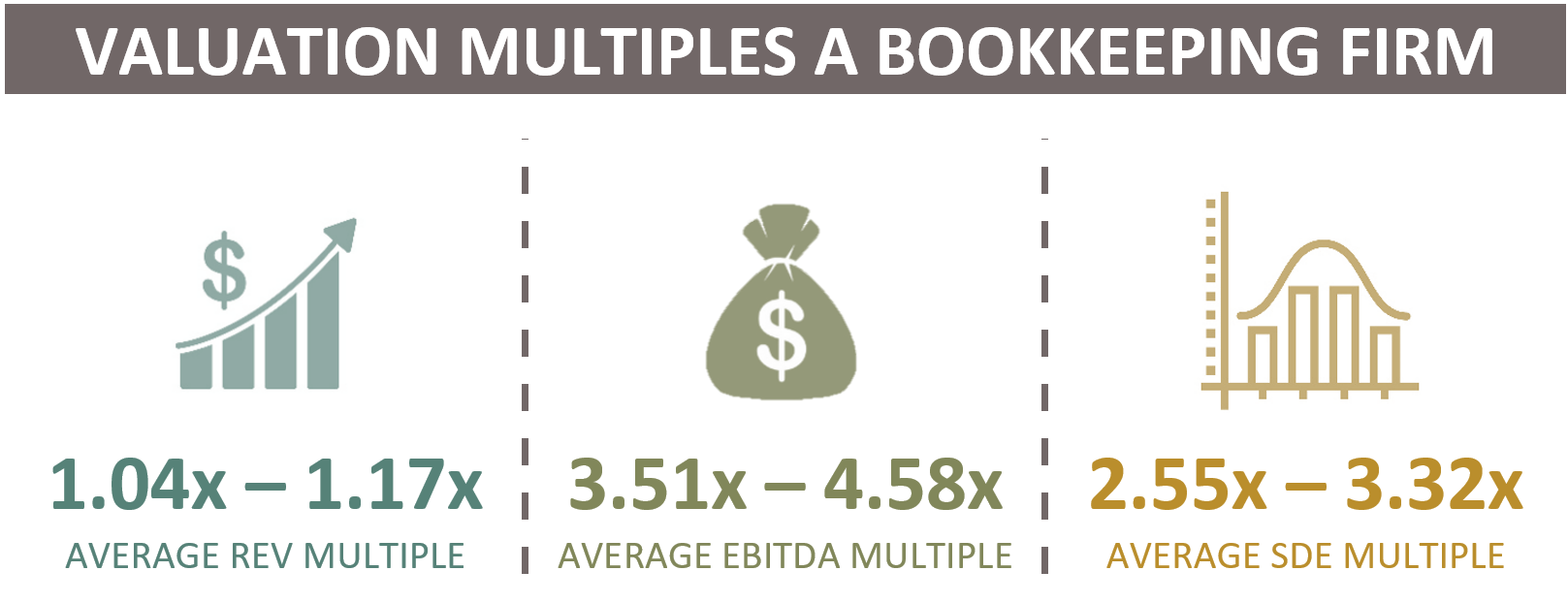
Valuation Multiples for a Bookkeeping Firm
The bookkeeping industry includes businesses that record, organize, and manage financial information for clients. According to IBIS World, the bookkeeping industry generated over $66 billion dollars in revenue over the past several years. Moving forward, we can expect demand for bookkeeping services to remain steady. As such, it may be an ideal time to buy or sell a bookkeeping firm. It is important to note that there is intense competition from both small and large players in the industry. To stand out from competitors, it is beneficial to learn about valuation multiples for a bookkeeping firm. These are key to valuing a bookkeeping firm if you plan to buy or sell a book of business.
Valuing a Bookkeeping Firm
Whether you are buying or selling a bookkeeping firm, it is important to understand how to value a bookkeeping firm. The best way to start is by receiving a business valuation. When buying a bookkeeping firm, a business valuation can help you determine a fair purchase price. The appraiser may also discuss negotiation strategies during a business valuation. If you are selling a bookkeeping firm, a business valuation can help increase its value. A business appraisal for a bookkeeping firm can also help in determining a fair listing price.
When determining the fair market value of a bookkeeping firm, there are various methods business appraisers may use. A popular method is the market approach which uses valuation multiples. In this article, we discuss valuation multiples for a bookkeeping firm. However, this article is only a guide. For more guidance, receive a business valuation for a bookkeeping firm. Peak Business Valuation, business appraiser, is happy to assist! We can provide a business valuation and answer any questions you may have on valuing a bookkeeping firm. Start now by scheduling a free consultation with Peak Business Valuation, business appraiser!
Valuation Multiples for a Bookkeeping Firm
Below we show average market multiples for a bookkeeping firm. When valuing a bookkeeping firm, it is common for a business appraiser at Peak Business Valuation to use multiples. However, these values are only averages. For multiples applicable to your bookkeeping firm, receive a business valuation. Peak Business Valuation is happy to provide a business valuation for a bookkeeping firm. Schedule a free consultation with Peak today to learn more!
Disclaimer: These multiples are for educational purposes only. As such, the information provided does not constitute valuation advice. These multiples do not represent the valuation opinion of Peak Business Valuation or its valuation professionals. Instead, seek the guidance and advice of a qualified business valuation professional about any matter in this article.
What is a Valuation Multiple?
Valuation multiples are ratios. For a bookkeeping firm, valuation multiples compare the business’s value to a financial metric. This includes metrics such as cash flow, earnings, or sales revenue. For instance, a common valuation ratio is the SDE multiple. This multiple compares the seller’s discretionary earnings of the bookkeeping firm to the implied value of the business. When determining a fair market value of a bookkeeping firm, the valuation expert analyzes the multiples of comparable bookkeeping firms. Then, the expert determines appropriate multiples for your bookkeeping firm and provides a range of value.
Suppose that a bookkeeping firm has $345,000 in SDE and receives a 2.90x SDE multiple. In this example, the firm would have an implied value of $1,000,500 ($345,000 times 2.90x). In contrast, a 3.22x multiple indicates that the value of the company is $1,110,900. ($345,000 times 3.22x).
Peak Business Valuation, business appraiser, works with bookkeepers across the nation. These individuals are often looking to buy, grow, or sell a bookkeeping firm. In the following sections, we highlight common valuation multiples for a bookkeeping firm. These multiples indicate the range of values that bookkeeping firms often transact at. It is important to remember that each bookkeeping firm is unique. As such, the value range may vary. Below, we discuss SDE, EBITDA, and REV multiples for a bookkeeping firm. To learn more about valuation multiples for a bookkeeping firm, schedule a free consultation with Peak Business Valuation!
SDE Multiples for a Bookkeeping Firm
Average SDE multiple range: 2.55x – 3.32x
According to Peak, bookkeeping firms transact at an average SDE multiple of 2.55x – 3.32x. To derive an implied value of a bookkeeping firm, take the seller’s discretionary earnings and apply the multiple. See the equation below.
SDE X Multiple = Value of the Business
For example, a bookkeeping firm generates $412,000 in seller’s discretionary earnings. It transacts at a 3.05x multiple. In this case, the value of the bookkeeping firm is about $1,256,600.
$412,000 X 3.05x = $1,256,600
Business appraisers often use SDE multiples when valuing a bookkeeping firm. To calculate SDE, the appraiser takes the bookkeeping firm’s profit and adds back any expenses that may not be incurred by the new owner. These expenses can include personal transactions, owner’s compensation, and non-recurring or non-related business expenditures. Doing this helps the valuation expert to determine the potential cash flow of the bookkeeping firm. This is crucial to determining the value of a bookkeeping firm.
EBITDA Multiples for a Bookkeeping Firm
Average EBITDA Multiple range: 3.51x – 4.58x
On average, bookkeeping firms transact between an EBITDA multiple range of 3.51x – 4.58x. Apply this multiple to EBITDA to determine an implied value of the business. We show the equation below.
EBITDA X Multiple = Value of the Business
In this example, a bookkeeping firm has an EBITDA of $310,000 and transacts at an EBITDA multiple of 4.04x. Using the above metrics, the bookkeeping firm is worth approximately $1,252,400.
$310,000 X 4.04x = $1,252,400
The EBITDA multiple helps determine a company’s return on investment (ROI). Many valuation experts prefer using the EBITDA multiple because it helps normalize differences. This allows them to compare your bookkeeping firm to similar firms. Normalized ratios provide a more accurate representation of the future earnings that a buyer can expect from a bookkeeping firm.
REV Multiples for a Bookkeeping Firm
Average REV Multiple range: 1.04x – 1.17x
According to our data, bookkeeping firms sell at an average REV multiple of 1.04x – 1.17x. A valuation expert can determine the implied value of the business by multiplying the amount of sales revenue a bookkeeping firm makes by the REV multiple. Refer to the calculation below.
Revenue X Multiple = Value of the Business
For instance, a bookkeeping firm makes $1,170,000 in revenue. It then transacts at a 1.12x multiple. In this case, the business is worth approximately $1,310,400.
$1,170,000 X 1.12x = $1,310,400
When a business appraiser at Peak Business Valuation is valuing a bookkeeping firm they will determine appropriate methods and multiples to use. Often revenue multiples are less relied upon in small business transactions.
Summary
There are many factors to consider when using valuation multiples for a bookkeeping firm. As such, it is best to receive professional guidance from Peak Business Valuation. Peak Business Valuation, business appraiser, is happy to provide a business valuation for a bookkeeping firm! During the valuation process, we discuss key factors that impact the value of a bookkeeping firm. We also highlight the valuation multiples applicable to your bookkeeping firm. To better understand valuation multiples for a bookkeeping firm, obtain a business valuation. Doing so can help you understand the value of a bookkeeping firm and how to increase it.
Peak Business Valuation, business appraiser, frequently values bookkeeping firms. At Peak, we focus on preparing you to buy, grow, or sell a bookkeeping firm. If you are looking to receive a business appraisal, Peak is happy to help! We can answer any questions you may have about valuation multiples for a bookkeeping firm. We can also discuss the details of valuing a bookkeeping firm. Schedule a free consultation with Peak today!
Be sure to also check out Valuing a Bookkeeping Firm, How to Value a Bookkeeping Business, and Value Drivers for a Bookkeeping Firm.

